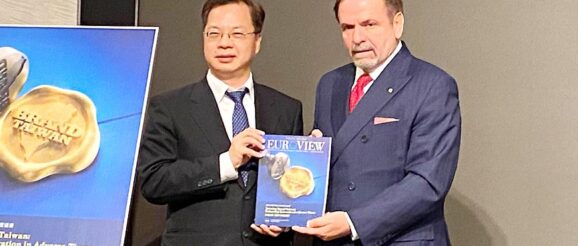Taiwan an investment, innovation haven: ECCT – Taipei Times

Taiwan an investment, innovation haven: ECCT
CHALLENGES:
While lauding its success in handling the pandemic, the ECCT said Taiwan faces challenges, such as the US-China tensions and the rise of the gig economy
Taiwan should seek to enhance innovation and promote itself as an international investment destination after effectively controlling the COVID-19 outbreak, the European Chamber of Commerce Taiwan (ECCT) said at a news conference to present its annual position paper.
“Taiwan has a unique opportunity to enhance innovation and promote it as an attractive investment destination, aided by its open society, a good geographical location, a reliable regulatory and legal system, abundant capital resources and a skilled workforce,” ECCT chairman Giuseppe Izzo said.
While Taiwan is less affected by the COVID-19 pandemic, it has to navigate the challenges posed by an aging society, US-China trade and other geopolitical tensions, and the rise of the gig economy, which continues to disrupt traditional employer/employee dynamics and erode social safety nets, Izzo said.
National Development Council Minister Kung Ming-hsin, left, receives a copy of the European Chamber of Commerce Taiwan’s annual position paper from chamber chairman Giuseppe Izzo at a news conference in Taipei yesterday.
Photo: Wu Chia-ying, Taipei Times
Taiwan should boost its image as a haven for talent because the drive for innovation requires talented individuals and dynamic companies that cultivate and support them, the position paper said.
Taiwan’s successful handling of the pandemic already lends support to its image as a safe place to live and work, the trade group said.
However, more could be done to attract and retain talent in Taiwan, the chamber’s human resources and better living committees said, adding that foreign residents are denied the government-issued Triple Stimulus Vouchers and benefits for people aged 65 or older.
The committees called for equal treatment for foreign nationals and modernization of Taiwan’s labor laws to take into account the complexities of modern workplaces and remote working, which render overtime pay and clocking in irrelevant.
The chamber lauded Taiwan’s commitment to an energy transition away from fossil fuels to sources of renewable energy, and the electrification of the transportation sector.
However, more could be done to speed up decarbonization and work toward creating a circular economy, it said.
“The transition will require a roadmap with annual targets for a nationwide electric vehicle [EV] charging system, subsidies for the electrification of car parking lots at strategic locations and new building codes that give apartment owners the right to install EV charging facilities,” said Christine Herbst-Kubitz, co-chair of the chamber’s electrical engineering and equipment committee.
The government should adopt a stricter approach in dealing with heavy industrial electricity users to promote renewable energy, the chamber said.
Energy storage is a crucial component in energy policy panning given the intermittent nature of renewable energy sources, it said.
ECCT members urged the authorities to develop a policy framework for energy storage that is technology neutral and flexible enough to encourage the development and utilization of technological breakthroughs.
